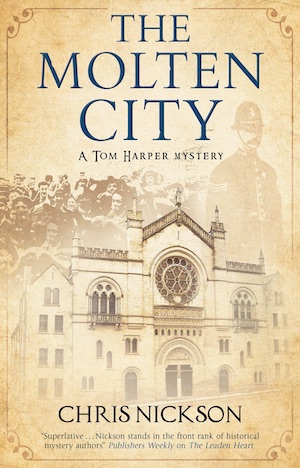Written by Chris Nickson — The publication of The Molten City comes as Chris Nickson is celebrating 10 years of writing historical crime fiction set in Leeds. His output covers every decade from the 1890s to the 1950s and he has written a number of series. In this book he returns to Detective Superintendent Tom Harper for his eighth outing.
It is 1908 and Harper has learnt that the prime minister, Herbert Asquith, is visiting Leeds. He knows that this will likely lead to demonstrations from both disgruntled workers and from suffragettes. Meanwhile, he receives an anonymous letter giving information about a child who was snatched 15 years earlier. The letter doesn’t name the person who took the child, but it suggests it was done to order for a wealthy local family, the Cranbrooks.
The disappearance of the child did happen but it soon becomes clear that the original investigation was woefully inadequate. This leads Harper to reinvestigate the case, and to consider the motives of the original investigating officer. As he does so he discovers further crimes. He faces a number of ethical dilemmas and sensitively deals with the people touched by the case. Still, there are consequences, and he has to face up to the impact on all the people involved, perpetrators and victims, of disturbing what happened years ago.
While he is balancing this complicated work life, he also has conflict at home. His wife Annabelle has a big decision to make. Annabelle and his daughter, Mary, both support women’s rights but differ on the best way forward. Annabelle is a suffragist – one of the women who believed in campaigning for the vote by empowering women through education and organisation – while Mary is drawn to the suffragettes. They believe that legal measures and reasoned argument have been ignored, and that only disruption through direct action will lead to meaningful change. The stage is set.
Harper is a likeable character, a natural leader who cares
for his team, supported by his strong home life and a relationship with his
family based on trust and mutual respect. Leeds itself has a prominent role. The
work of the police takes them across the city. The Harpers live in the (real)
Victoria pub in Sheepscar. Annabelle is strongly engaged in the work of the
community and Mary is just beginning her career as a secretary for a solicitor.
There is a strong focus on the issues of the day – not just
the national issues exemplified by the prime minister’s visit and those who
want to disrupt it, but the issues on the ground in Leeds – the poverty, the
class structure, and the opportunities that are (or are not) open to different
people. Andrew Cranbrook, the man who is alleged to have paid for the
child-snatching, is a man who has risen to prominence from humble beginnings.
Harper’s role, particularly during Asquith’s visit, also brings him into
contact with the upper classes.
A number of less well-known historical figures make an
appearance, including the suffragette Jennie Barnes and Alf Kitson, who headed
up the unemployed men. It’s also interesting seeing the records and information
that the police are able to access. The various issues are threaded skilfully
through the story and the personal and professional lives of Harper and his
fellow police officers.
Nickson has previously said that he intends to take Tom Harper’s story up until the end of World War I, so we can look forward to more of his series.
Read our interview with Chris Nickson.
Severn House
Print/Kindle
£12.34
CFL Rating: 4 Stars
